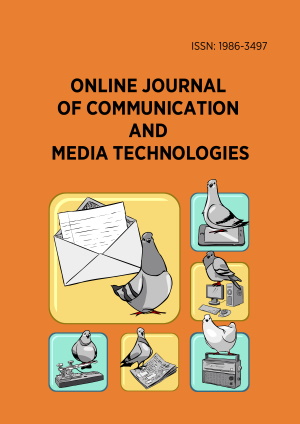Research Article
The Migration from AM Radio to FM Radio in Brazil: Implications for Listeners and Local Broadcasters
More Detail
1 Universidade Federal de Ouro Preto, BRAZIL2 Universidade Federal de Santa Maria, BRAZIL* Corresponding Author
Online Journal of Communication and Media Technologies, 11(3), July 2021, e202110, https://doi.org/10.30935/ojcmt/11081
OPEN ACCESS 3622 Views 2889 Downloads
ABSTRACT
The migration of AM (Amplitude Modulation) to FM (Frequency Modulation) radios is the most important change in the configuration of Brazilian broadcasting in years, reaching more than 90% of the stations in the country. This process started in 2013 and the local radio stations were the first ones affected. In Brazil, local radio is an important part of the daily life of small cities, in listening habits shared between people of several generations. This article is based on a wide-ranging survey conducted with listeners from Itatiaia Ouro Preto Radio, a local broadcaster in the Brazilian state of Minas Gerais. The methodology combined documentary research, application of questionnaires and interviews with the aim of exploring in depth the listeners’ speeches about the intersections between the migration of the station, the changes in radio listening experiences and the potential of local radio in the small historic city. The results show that the changes caused by the migration of AM stations are challenging for these radio stations and are felt by a loyal audience, used to the traditional characteristics of these stations. The phenomenon impacts the forms of production, consumption, circulation, proximity dynamics and key radio functions.
CITATION (APA)
Prata, N., & Medeiros, R. (2021). The Migration from AM Radio to FM Radio in Brazil: Implications for Listeners and Local Broadcasters. Online Journal of Communication and Media Technologies, 11(3), e202110. https://doi.org/10.30935/ojcmt/11081
REFERENCES
- Bertolotto, R. (2018). País sem sintonia: depois de integrar o Brasil por décadas, o rádio vive mudanças que podem provocar o efeito contrário [Country out of tune: after being part of Brazil for decades, radio is experiencing changes that could have the opposite effect]. UOL Tab. https://tab.uol.com.br
- Bourdin, A. (2001). A questão local [the local issue]. DP&A.
- Calil, M. R. (2018). Expansão urbana em Ouro Preto–MG: o risco de ocupar encostas mineradas [Urban expansion in Ouro Preto–MG: The risk of occupying mined slopes]. Federal University of Viçosa. Viçosa, Minas Gerais, Brazil.
- Cebrián Herreros, M. (2001). La radio en la convergência multimedia [The radio in the multimedia convergence]. Gedisa.
- Del Bianco, N. R., & Prata, N. (2018). Rádio, mobilidade e ubiquidade: análise do projeto de inclusão mobile digital da Abert [Radio, mobility and ubiquity: analysis of Abert’s mobile digital inclusion project]. Intercom, Revista Brasileira de Ciências da Comunicação, 41(1). São Paulo Jan./Apr. 2018. https://doi.org/10.1590/1809-5844201815
- Ferraretto, L. A., & Kischinhevsky, M. (2010). Rádio e convergência: uma abordagem pela economia política da comunicação [Radio and convergence: an approach to the political economy of communication]. Revista Famecos, 17(3). https://doi.org/10.15448/1980-3729.2010.3.8185
- Fidler, R. (1997). Mediamorphosis – Understanding New Media. Pine Forge Press.
- Hall, S. (2006). A identidade cultural na pós-modernidade [Cultural identity in postmodernity]. DP&A.
- Kischinhevsky, M. (2016). Rádio e mídias sociais: Mediações e interações radiofônicas em plataformas digitais de comunicação [Radio and social media: Mediations and radio interactions in digital communication platforms]. Mauad X.
- Lopez, D. C. (2017). La radio en narratives immersives: le contenu journalistique et l’audience [Radio in immersive narratives: journalistic content and audience]. (D. C. Lopez, Trans.). In S. Paulain (Ed.), La radio du futur: du téléchromophotophonotétroscope aux postradiomorphoses, Cahiers d’histoire de la radiodiffusion, 132.
- Macedo, D. (2013). Dilma assina decreto autorizando migração de rádios AM para FM [Dilma signs a decree authorizing the migration from AM to FM radios]. EBC. https://bit.ly/3ec3eMx
- Martín-Barbero, J. (2003). Globalização comunicacional e transformação cultural [Communication globalization and cultural transformation]. In D. Moraes (Ed.), Por uma outra comunicação: mídia, mundialização cultural e poder. Record.
- Medeiros, R. (2019). O rádio e a cidade patrimônio: experiências de escuta, localismo e migração nos discursos de ouvintes Ouro-Pretanos [The radio and the heritage city: listening experiences, localism and migration in the speeches of Ouro-Pretanos listeners] (Masters dissertation), Institute of Applied Social Sciences, Universidade Federal de Ouro Preto, Mariana.
- Moraes, R., & Galiazzi, M. (2016). Análise Textual Discursiva [Discursive Textual Analysis]. Editora Unijuí.
- Ortiz, R. (1999). Um outro território: Ensaios sobre a mundialização [Another territory: Essays on globalization]. Olho D’água.
- Peruzzo, C. M. K. (2005). Mídia regional e local: aspectos conceituais e tendências [Regional and local media: conceptual aspects and trends]. Comunicação & Sociedade, 26(43), 67-84. https://doi.org/10.15603/2175-7755/cs.v26n43p67-84
- Pesavento, S. J. (2006). Fronteiras culturais em um mundo planetário - paradoxos da(s) identidade(s) sul-latino-americana(s) [Cultural borders in a planetary world - paradoxes of South Latin American identity(ies)]. Revista del CESLA, 8(1), 9-19.
- Prata, N. (2009). Webradio – novos gêneros, novas formas de interação [Webradio – new genres, new forms of interaction]. Editora Insular.
- Prata, N., & Del Bianco, N. R. (2018). Impacto da migração do radio AM para o FM no Brasil [Impact of migration from AM radio to FM in Brazil]. In Migração do radio AM para o FM – Avaliação de impacto e desafios frente à convergência tecnológica. Editora Insular.
- Raddatz, V. L. S. (2011). Rádio AM “avisa”: uma expressão da cultura local [AM Radio “warns”: an expression of local culture]. In L. Klöckner & N. Prata (Eds.), Mídia sonora em 4 dimensões: 1ª ouvintes e falantes, 2ª memória política, 3ª programas de rádio, 4ª tecnologia e futuro. EdiPUCRS.
- Ribeiro, A. P. G. (2015). A história oral nos estudos de jornalismo: algumas considerações teórico-metodológicas [Oral history in journalism studies: some theoretical-methodological considerations]. Revista Contracampo, 32(2), 73-90. https://doi.org/10.22409/contracampo.v0i32.668
- Ronsini, V. M. (2007). Mercadores de sentido: Consumo de mídia em identidades juvenis [Merchants of meaning: Media consumption in youth identities]. Sulina.

 The articles published in this journal are licensed under the CC-BY Creative Commons Attribution International License.
The articles published in this journal are licensed under the CC-BY Creative Commons Attribution International License.